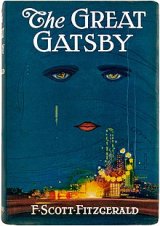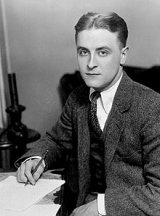The Great Gatsby Page #31
The Great Gatsby is a 1925 novel by American writer F. Scott Fitzgerald. Set in the Jazz Age on Long Island, near New York City, the novel depicts first-person narrator Nick Carraway's interactions with mysterious millionaire Jay Gatsby and Gatsby's obsession to reunite with his former lover, Daisy Buchanan. The novel was inspired by a youthful romance Fitzgerald had with socialite Ginevra King, and the riotous parties he attended on Long Island's North Shore in 1922
------------------------------------------------------------------------ The Buchanans’ house floated suddenly toward us through the dark rustling trees. Tom stopped beside the porch and looked up at the second floor, where two windows bloomed with light among the vines. “Daisy’s home,” he said. As we got out of the car he glanced at me and frowned slightly. “I ought to have dropped you in West Egg, Nick. There’s nothing we can do tonight.” A change had come over him, and he spoke gravely, and with decision. As we walked across the moonlight gravel to the porch he disposed of the situation in a few brisk phrases. “I’ll telephone for a taxi to take you home, and while you’re waiting you and Jordan better go in the kitchen and have them get you some supper—if you want any.” He opened the door. “Come in.” “No, thanks. But I’d be glad if you’d order me the taxi. I’ll wait outside.” Jordan put her hand on my arm. “Won’t you come in, Nick?” “No, thanks.” I was feeling a little sick and I wanted to be alone. But Jordan lingered for a moment more. “It’s only half-past nine,” she said. I’d be damned if I’d go in; I’d had enough of all of them for one day, and suddenly that included Jordan too. She must have seen something of this in my expression, for she turned abruptly away and ran up the porch steps into the house. I sat down for a few minutes with my head in my hands, until I heard the phone taken up inside and the butler’s voice calling a taxi. Then I walked slowly down the drive away from the house, intending to wait by the gate. I hadn’t gone twenty yards when I heard my name and Gatsby stepped from between two bushes into the path. I must have felt pretty weird by that time, because I could think of nothing except the luminosity of his pink suit under the moon. “What are you doing?” I inquired. “Just standing here, old sport.” Somehow, that seemed a despicable occupation. For all I knew he was going to rob the house in a moment; I wouldn’t have been surprised to see sinister faces, the faces of “Wolfshiem’s people,” behind him in the dark shrubbery. “Did you see any trouble on the road?” he asked after a minute. “Yes.” He hesitated. “Was she killed?” “Yes.” “I thought so; I told Daisy I thought so. It’s better that the shock should all come at once. She stood it pretty well.” He spoke as if Daisy’s reaction was the only thing that mattered. “I got to West Egg by a side road,” he went on, “and left the car in my garage. I don’t think anybody saw us, but of course I can’t be sure.” I disliked him so much by this time that I didn’t find it necessary to tell him he was wrong. “Who was the woman?” he inquired. “Her name was Wilson. Her husband owns the garage. How the devil did it happen?” “Well, I tried to swing the wheel—” He broke off, and suddenly I guessed at the truth. “Was Daisy driving?” “Yes,” he said after a moment, “but of course I’ll say I was. You see, when we left New York she was very nervous and she thought it would steady her to drive—and this woman rushed out at us just as we were passing a car coming the other way. It all happened in a minute, but it seemed to me that she wanted to speak to us, thought we were somebody she knew. Well, first Daisy turned away from the woman toward the other car, and then she lost her nerve and turned back. The second my hand reached the wheel I felt the shock—it must have killed her instantly.” “It ripped her open—” “Don’t tell me, old sport.” He winced. “Anyhow—Daisy stepped on it. I tried to make her stop, but she couldn’t, so I pulled on the emergency brake. Then she fell over into my lap and I drove on. “She’ll be all right tomorrow,” he said presently. “I’m just going to wait here and see if he tries to bother her about that unpleasantness this afternoon. She’s locked herself into her room, and if he tries any brutality she’s going to turn the light out and on again.” “He won’t touch her,” I said. “He’s not thinking about her.” “I don’t trust him, old sport.” “How long are you going to wait?” “All night, if necessary. Anyhow, till they all go to bed.” A new point of view occurred to me. Suppose Tom found out that Daisy had been driving. He might think he saw a connection in it—he might think anything. I looked at the house; there were two or three bright windows downstairs and the pink glow from Daisy’s room on the ground floor. “You wait here,” I said. “I’ll see if there’s any sign of a commotion.” I walked back along the border of the lawn, traversed the gravel softly, and tiptoed up the veranda steps. The drawing-room curtains were open, and I saw that the room was empty. Crossing the porch where we had dined that June night three months before, I came to a small rectangle of light which I guessed was the pantry window. The blind was drawn, but I found a rift at the sill. Daisy and Tom were sitting opposite each other at the kitchen table, with a plate of cold fried chicken between them, and two bottles of ale. He was talking intently across the table at her, and in his earnestness his hand had fallen upon and covered her own. Once in a while she looked up at him and nodded in agreement. They weren’t happy, and neither of them had touched the chicken or the ale—and yet they weren’t unhappy either. There was an unmistakable air of natural intimacy about the picture, and anybody would have said that they were conspiring together. As I tiptoed from the porch I heard my taxi feeling its way along the dark road toward the house. Gatsby was waiting where I had left him in the drive. “Is it all quiet up there?” he asked anxiously. “Yes, it’s all quiet.” I hesitated. “You’d better come home and get some sleep.” He shook his head. “I want to wait here till Daisy goes to bed. Good night, old sport.” He put his hands in his coat pockets and turned back eagerly to his scrutiny of the house, as though my presence marred the sacredness of the vigil. So I walked away and left him standing there in the moonlight—watching over nothing. VIII I couldn’t sleep all night; a foghorn was groaning incessantly on the Sound, and I tossed half-sick between grotesque reality and savage, frightening dreams. Toward dawn I heard a taxi go up Gatsby’s drive, and immediately I jumped out of bed and began to dress—I felt that I had something to tell him, something to warn him about, and morning would be too late. Crossing his lawn, I saw that his front door was still open and he was leaning against a table in the hall, heavy with dejection or sleep. “Nothing happened,” he said wanly. “I waited, and about four o’clock she came to the window and stood there for a minute and then turned out the light.” His house had never seemed so enormous to me as it did that night when we hunted through the great rooms for cigarettes. We pushed aside curtains that were like pavilions, and felt over innumerable feet of dark wall for electric light switches—once I tumbled with a sort of
Translation
Translate and read this book in other languages:
Select another language:
- - Select -
- 简体中文 (Chinese - Simplified)
- 繁體中文 (Chinese - Traditional)
- Español (Spanish)
- Esperanto (Esperanto)
- 日本語 (Japanese)
- Português (Portuguese)
- Deutsch (German)
- العربية (Arabic)
- Français (French)
- Русский (Russian)
- ಕನ್ನಡ (Kannada)
- 한국어 (Korean)
- עברית (Hebrew)
- Gaeilge (Irish)
- Українська (Ukrainian)
- اردو (Urdu)
- Magyar (Hungarian)
- मानक हिन्दी (Hindi)
- Indonesia (Indonesian)
- Italiano (Italian)
- தமிழ் (Tamil)
- Türkçe (Turkish)
- తెలుగు (Telugu)
- ภาษาไทย (Thai)
- Tiếng Việt (Vietnamese)
- Čeština (Czech)
- Polski (Polish)
- Bahasa Indonesia (Indonesian)
- Românește (Romanian)
- Nederlands (Dutch)
- Ελληνικά (Greek)
- Latinum (Latin)
- Svenska (Swedish)
- Dansk (Danish)
- Suomi (Finnish)
- فارسی (Persian)
- ייִדיש (Yiddish)
- հայերեն (Armenian)
- Norsk (Norwegian)
- English (English)
Citation
Use the citation below to add this book to your bibliography:
Style:MLAChicagoAPA
"The Great Gatsby Books." Literature.com. STANDS4 LLC, 2025. Web. 27 Feb. 2025. <https://www.literature.com/book/the_great_gatsby_1598>.








Discuss this The Great Gatsby book with the community:
Report Comment
We're doing our best to make sure our content is useful, accurate and safe.
If by any chance you spot an inappropriate comment while navigating through our website please use this form to let us know, and we'll take care of it shortly.
Attachment
You need to be logged in to favorite.
Log In